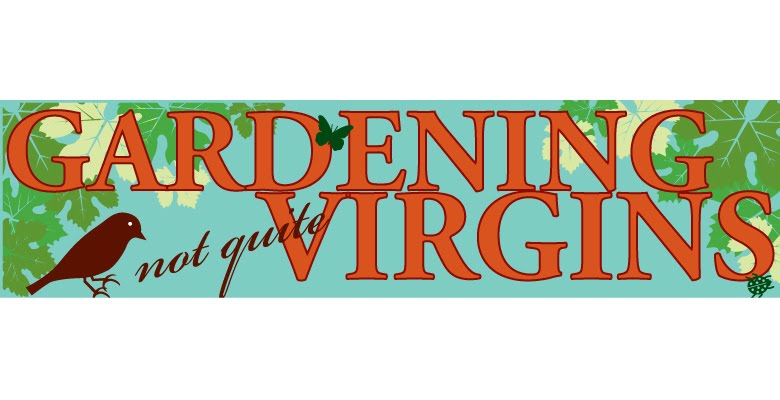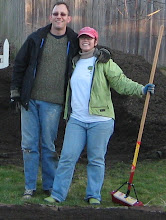
Blame it on Barbara Kingsolver. She turned us into Gardening Virgins. How did the writer of so many of my favorite novels (The Poisonwood Bible! The Bean Trees! Pigs in Heaven!) inspire this major, life-changing experiment for we two forty-something city dwellers? She wrote another book. In her amazing Animal, Vegetable, Miracle, BK (as she will now be known) recounted how she and her family completely revamped their eating habits. As we listened to her narrate the story during a road trip last summer, our brain cells were quietly rearranged. And we became gardeners.
Boy, did BK do a number on me. See, I'm a vegetarian--for many reasons, but the original impetus way back in the 80's was the destruction of the South American rain forests. I was appalled that thousands of acres were being slashed and burned to make room for cattle--US-fast-food-chain-hamburgers cattle. So, all along I've been doing a good thing for the environment (not to mention the animals), right? I mean, I'm not contributing to the ridiculous amount of water and land it takes to raise beef cattle. I'm refusing to support the factory farms that subject pigs, lambs and chickens to horrible living (and dying) conditions. I'm all soy, all the time. Good for me!
Except that soy is not local. And it is not usually organic. And, thanks to BK, I learned that great amounts of oil are needed to transport soybeans to processing plants, and eventually to market, in the form of fake meat burgers and sausages, and various tofu products I depend on for protein. And then I read that rain forests are being razed to grow soybeans! I'm back at the beginning of a twenty-year circle. What's a good-hearted vegetarian to do??
BK, her husband, and daughter (co-writers of the book) advocate for local eating. Grow what you can, support small, local, organic farmers, and learn how to do without tomatoes in February, or blueberries in November. That makes sense, feels good and sounds easy enough--especially here in our corner of Washington state, where we are the luckiest sustainably-locally-organically-focused people IN THE WORLD. I have the choice to buy locally, ethically raised meats, fresh, reefnet-caught (ancient Native method) fish, eggs from my neighbors, and vegetables and fruit from dozens of local farmers, plus artisan cheeses and locally-roasted coffee. I am SO LUCKY.
BK also informed me--and I can't believe I didn't know or choose to learn this--that those soybeans were harvested at a price. Thousands of squirrels, foxes, rabbits, birds and bugs are destroyed in the process of growing and cutting soybeans. Duh. So much for animal cruelty free diets.
So here's The Big Question for me: Is it better to eat tofu made from Midwest soybeans, which consumed way too much oil and have been processed within an inch of their little round lives to get to my refrigerator--or to eat a humanely and locally raised organic chicken, cow, or lamb?
Better for the environment? Probably--no, not probably--yes. The overall environmental impact of those animals is probably less than the tofu. I can't kid myself into thinking that my tofu is animal-free--not when animals died to get it to my table. But better for me? I'm a bleeding heart animal lover, and I made a conscious decision twenty years ago to stop eating them--all of them. I don't eat anything that walked, swam, or flew. And I cannot bring myself to start doing so now.
I applaud and respect BK's approach. She and her family raise their own vegetables, plus eggs, chickens, and turkeys. She can describe in (poetic) detail the steps it takes to butcher a turkey--because she's done it. I have so much more tolerance for them than for people who eat whatever's put in front of them, without a moment's thought to the suffering it caused the earth, the animal, or the farm worker. I'm a butcher's daughter, and I know what it looks like before it hits the grocery store. I respect that part of the process. But I can't bring myself to eat it.
I'm going to try eating some eggs soon. Maybe I'll mix some organic, homegrown, chives from our garden--assuming they grow. You are invited to join us as we try to figure out when to start our seeds, and when our last frost starts, or our first frost ends, or whatever it is we should have known before we started this madness.







No comments:
Post a Comment
Help us. Please.